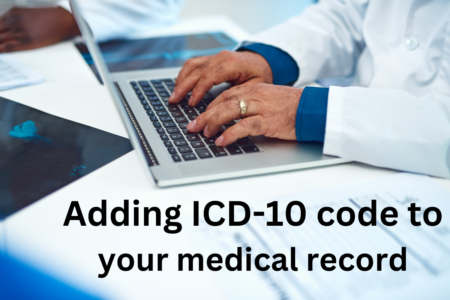by William Saraille, Washington DC
 We hope we that in the not-too-distant future, treatments for FSHD will be approved by the Food and Drug Administration. But when that time comes, will you be treatment ready?
We hope we that in the not-too-distant future, treatments for FSHD will be approved by the Food and Drug Administration. But when that time comes, will you be treatment ready?
Payers will likely insist, at a minimum, that any patient qualifying for coverage have the International Classification Disease Code (ICD-10) for FSHD listed in their medical record. But chances are that the diagnosis code, G71.02, is not currently in your record.
If you live outside the U.S., ask what the standard medical coding system is there. Some countries use the ICD-11. The ICD-11 code for FSHD is 8C70.3.
A recent review of a claims database containing medical records for more than 260 million U.S. individuals from 2016 to 2023 identified approximately 10,500 patients with at least one claim associated with the G71.02 diagnosis code —equivalent to roughly 1 in 25,000 individuals. Given that FSHD is estimated to affect between 1 in 15,000 and 1 in 8,000 individuals in the U.S., this suggests that between 9,000 and 28,000 patients in the U.S., with a total population of 330 million, may not have a recorded G71.02 diagnosis code.
What can you do to make sure your medical record contains the G71.02 code? You can use two rights under the Health Insurance Portability and Accountability Act (HIPAA): 1) the right to obtain access to your medical record and secure copies of that record and 2) the right to seek an amendment to your record.
Obtaining your record
Under HIPAA, you can ask your health care provider (your neurologist, for instance), in writing, for a copy of your medical record. Asking for the record of your last visit should be sufficient. The provider generally has 30 days to produce the copies. You can be charged for the records, but only a reasonable cost-based fee.
Once you get your record, take a look and see if the code G71.02 is listed. You might see other codes that link to related conditions, like muscular dystrophy, G71.0, but you likely will need the FSHD specific code to secure coverage when the time comes.
If my record doesn’t have the code, what do I do?
Have a conversation with your health care provider.
Maybe it’s not listed because your records haven’t been updated since the FSHD code became effective on October 1, 2018. A lot of times old, pre-existing codes just get regenerated in records, over and over again.
If you have not yet had genetic testing, your provider might be a hesitant to commit to that diagnosis, even though you are confident you have FSHD.
A conversation with your provider should clarify the situation.
What if you aren’t satisfied after you speak with your provider?
You have the right to request an amendment to your medical record. Ask your provider in writing to add the G71.02 code to your record. If the provider does not do so, he or she is required to explain why.
Special thanks to Analysis Group, an international economic consulting firm that provides expert analysis and testimony on healthcare issues and strategy to top law firms, Fortune 500 companies, and government agencies, for its claims analysis, which it provided free of charge to the Society.


Leave a Reply